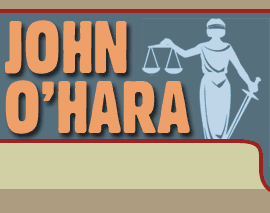New York Man Fights Illegal Voting Conviction
Boston Globe
January 8, 2004
By Daryl McGrath
http://www.boston.com/news/nation/articles/2004/
01/08/ny_man_fights_illegal_voting_conviction/
ALBANY, N.Y. -- A disbarred Wall Street lawyer, convicted of the almost unheard-of felony charge of illegal voting, is seeking vindication through a last-ditch appeal to the US Supreme Court.
The appellant is John Kennedy O'Hara, a longtime Brooklyn political activist who ran several insurgent campaigns against the Brooklyn Democratic machine until 1996, when he was convicted of voting using an address that was not his permanent residence. He says party bosses targeted him for prosecution to silence him.
The Supreme Court is scheduled to decide tomorrow whether it will accept the appeal. The case has wended through state and federal courts, an odyssey that has included a conviction, a reversal on appeal, a hung jury in a second trial, and then another conviction. A state appeals court in Albany upheld the second conviction.
O'Hara has made a full-time pursuit out of seeking an overturn of his conviction and reinstating his right to vote and his ability to practice law. He faced up to 28 years in prison on seven charges of illegal voting, but instead was sentenced to 1,500 hours of community service. He has spent that time picking up garbage in Brooklyn parks. His appeals have cost him tens of thousands of dollars, but he said he has persevered on behalf of other activists who might be intimidated by fears of similar prosecutions.
"If you're going to start prosecuting people for voting, there's not much left after that," he said. "You don't have much choice when you're a convicted felon and a disbarred attorney, because you're wrecked."
He said Brooklyn District Attorney Charles Hynes, backed by the Brooklyn Democratic Party, selectively prosecuted him for voting using the address he shared for a year with his then-girlfriend, even as he maintained his longtime apartment 14 blocks away in Brooklyn.
O'Hara practiced at a Wall Street law firm while also following his political passions. He thinks mainstream Democrats wanted to silence him because of his habit of running for office and also running the campaigns of insurgent candidates.
In 1996, O'Hara was among several people who filed a federal lawsuit seeking new primaries in elections for legislative offices and judgeships. In such races in Brooklyn and much of New York City, the primaries almost always decide the winner. O'Hara, an unsuccessful candidate for a state Assembly seat that year, was charged with illegal voting a few weeks later. The elections from which the criminal charges stemmed had occurred four years earlier.
A spokesman for Hynes dismissed O'Hara's accusation of selective prosecution.
"Mr. O'Hara has had a day and a half in court, and the district attorney's position has been consistently upheld," spokesman Jerry Schmetterer said. "We've been commenting on this for a long time, and going to the Supreme Court -- he's certainly entitled to do it, but this case has already been adjudicated three times."
O'Hara is the first person convicted of illegal voting in New York since Susan B. Anthony, who voted in a federal election in Rochester in 1872, when only men had the right, said O'Hara's attorney, Barry Fallick. Others have noted the rarity of O'Hara's conviction.
"Usually cases like this aren't prosecuted," said Lee Daghlian, a spokesman for the New York State Board of Elections. "They're not high on most DAs' lists, this sort of thing."
Illegal voting was seldom prosecuted in New York City even when it was a blatant part of politics, said Dan Lorello, a state archivist. "Illegal voting happened all the time in New York City in the 19th century. You voted early and often. Dead people, ballot stuffing -- it was like Chicago. But nobody really got convicted."
Given that history, and the brutal style of Brooklyn politics, the prosecution of O'Hara has raised some eyebrows. The David-vs.-Goliath nature of O'Hara's battle against the Brooklyn District Attorney's office also has won O'Hara the support from the editorial pages of several New York newspapers.
"From the Brooklyn DA's perspective, it's proven to be a mistake to have prosecuted the case, even though he won, because he's gotten so much bad publicity over it," said Erik Engquist, a political columnist for Courier Life Publications, a group of Brooklyn community newspapers.
"The suggestion that it wasn't politically motivated is just absurd. Brooklyn politics is not for the fainthearted. There is retribution, there is recrimination if you cross certain lines. John O'Hara did cross those lines, but on the other hand, he was never important enough to justify the response he got. He has suffered greatly from this experience. And he is clutching to the thinnest thread of legal hope."
The New York State Court of Appeals in Albany upheld O'Hara's conviction in a 5-to-2 vote in 2001. The Second Circuit Court of Appeals subsequently refused to grant him an appeal.
O'Hara, who participated in his first political campaign at age 12 by handing out fliers for George McGovern, said waiting for the Supreme Court's decision is relatively easier because he has suffered many defeats. "You have to hang in there," he said. "You have to give it a shot."

